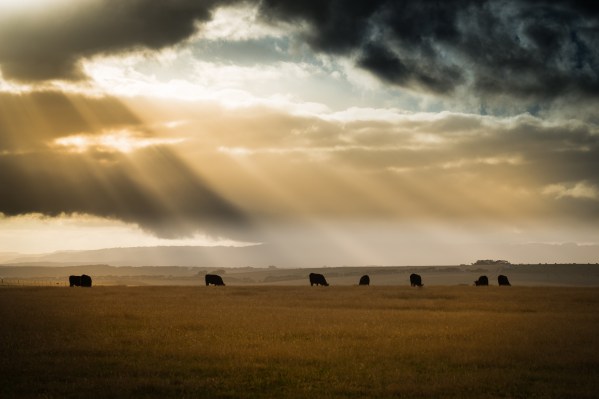
When it comes to sustainable livestock production and agriculture, measurement is the first — and sometimes most elusive — step in the process of turning our food system from a carbon emitter into a carbon sink.
So DSM, a science-based company that focuses on agriculture and other parts of our food systems, and Blonk, a data analytics for sustainability consultancy, developed Sustell, a combination software and practical service for ranchers to understand and improve the sustainability of their operations.
While sustainable and regenerative agriculture doesn’t have a universally agreed-upon definition, it usually involves changing land management practices to sequester more carbon in the soil, using more environmentally friendly animal feeds and reducing fossil fuel usage of tractors and other farm equipment among many other changes. The goal is to reduce the 7.1 gigatonnes of CO2 released into the atmosphere, about 14.5% of all greenhouse gas emissions, created by the livestock industry.
“There’s this tremendous need for accurate footprinting of animal production down to the individual farm level,” said David Nickell, vice president of sustainability and business solutions at DSM. “And each farm, of course, is very different. And you have to have a system which is able to use actual farm data, and to get an accurate picture of that particular farm.”
The system analyzes the environmental impact of a farm’s activity on 19 different categories, including climate change, resource use, water scarcity, runoff and ozone depletion. Farmers provide data on their daily operations, including feed composition and use, manure management practices, animal mortality, the electricity system and the other infrastructure, transportation logistics and mitigation technologies employed, like scrubbers or excess heat circulation systems, and sometimes packaging to the software.
Blonk’s environmental footprint technology then produces a life cycle assessment of the farm, an analysis of the environmental impact of rearing an animal from inception to when it exits the farm gate. DSM and Blonk have created Sustell modules for most land farm animals, including chickens, pigs and dairy and egg production, and plans to extend it to cover beef and aquaculture.
“What is really key is that we were able to build on this momentum of methodologies and standards that have been developed,” said Hans Blonk, CEO of Blonk Consultants and Blonk Sustainability Tools.
Blonk was able to combine agriculture environmental standards from the Food and Agriculture Organization of the United Nations, European Commission and many others in one place to create the vast library of background data needed for the software to produce useful and actionable insights.
“Customers at the moment really want to understand what they’re doing,” Nickell said. “They want to understand their baseline [footprint] and rank them. Understand what’s good, and what’s not so good. Customers want to understand how they rate compared to peer benchmarking, whether it’s a country or an industry benchmark.”
Once the Sustell software gives farmers clarity on the emissions on their farms, they can then identify where improvements need to be made and DSM helps implement ways of reducing those emissions, creating an end-to-end service for customers and hopefully a positive impact on the planet.
“Practical interventions make change happen,” Nickell said. “We’ve invested in technologies which reduce the footprint of animal products production. The service is measurement and marry that up with bringing solutions, which make a difference. That’s the complete solution to making this much-needed change happen.”
But in order for Sustell to create that change, it needs to be adopted widely and the learnings need to be shared between competitors. Right now, DSM and, in some ways, the capitalist system, isn’t set up for that.
According to Nickell, DSM is first focusing Sustell on big integrated livestock companies. This is a common challenge with new innovative environmental technologies that can be adopted by big farming conglomerates or co-ops with money and resources to spend, while smaller family farms get left behind. But Nickell hopes that Sustell can scale to work with smaller farms, as well.
The second issue is around data sharing. While Nickell was very clear that Sustell will be following all applicable data privacy and ownership rules — and that’s usually a good thing — in order to really create meaningful environmental change, transparency is actually key. Competitors need to share the best ways for reducing emissions so everyone can adopt them and save the planet, but many companies are very data protective.
“I think maybe that [data sharing] develops in time,” Nickell said. “I don’t think we’re there yet. Maybe it will get to that level as more and more customers are transparent on their footprint and their reporting.”



